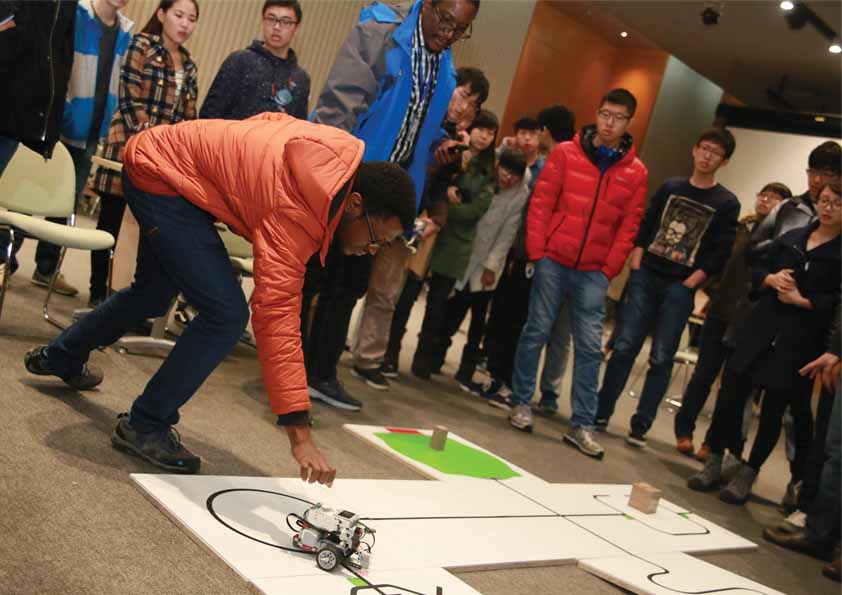22 Dec 2015
The Lego Mindstorms project is hands-on practice for the CSE003 module that introduces the basic concepts and theories of computer programming. This project requires teams of four students to design, build, program and road-test their own robots.
Nearly 480 first year students from the Computer Science and Software Engineering Department, the Electrical and Electronic Engineering Department and another four departments were involved.
Dr Haining Liang, leader of the module, said: “At present, Xi’an Jiaotong-Liverpool University is in a minority of universities bringing Lego Mindstormsinto the teaching process. This activity has been held for three years. Each year, we make some changes. For example, this year we will award certifications for excellent teams.”
During the test, the robots constructed by students were expected to follow certain lines and run mazes. The robots were required to move straight forward, accelerate or swerve smoothly and accurately within a limited time.
.jpg)
A team consisting of Qiuchen Qian, Yuliang Hu and Hongkai Zhou from CSSE as well as Quan Zhou from the Biological Sciences Department completed the test within 180 seconds. They divided the preparation work according to their specific abilities: Hongkai Zhou and Quan Zhou were mainly responsible for brainstorming and summary work; Qiuchen Qian and Yuliang Hu for programming and testing.
“We only had two chances,” they said, “So we felt extremely nervous during the whole process, especially when our robot failed the first time due to an improper angle.”
Yuanyuan Wang from CSSE also perceived this test as a profound challenge: “Our team encountered lots of difficulties when writing the program, and we conducted a number of discussions to tackle these.”

“Hands on innovation experience is stressed in this module”, explained Dr Liang.“So, there is no final exam. In most cases, students are highly focused on examinations and neglect the significance of practical operation ability. We like to see students making use of the programming knowledge and skills learned in lectures when building their robots.”
Teachers for CSSE and the Mathematical Sciences Department acted as judges, pointing out some design defects and offering some feasible solutions for students to improve their designs in the future.
Xiaosheng Gu, a student of Applied Informatics and a teaching assistant and participant in the design process of the test, said: “Through this activity, I not only have had the opportunity to interact with others, but also to build on my studies, especially in pseudocode algorithms.”
The teaching assistants of this module were 12 PhD and masters students from CSSE, both Chinese and international, and were co-ordinated by Vijayakumar Nanjappan. Equipment was co-ordinated by Guangda Zhang.
Professor Yong Yue, Head of CSSE, said: “This innovative teaching activity was sponsored and supported by our University, numerous teachers from CSSE, and XJTLU vice president Professor André Brown.”
22 Dec 2015








